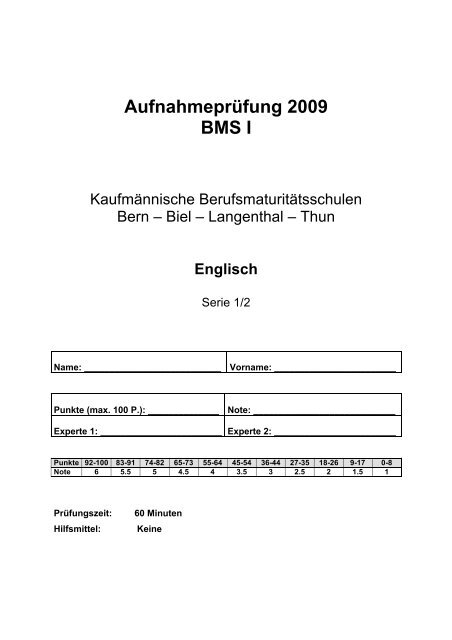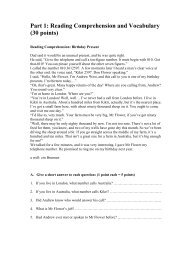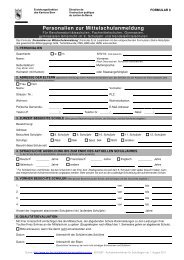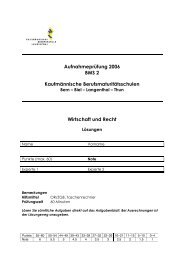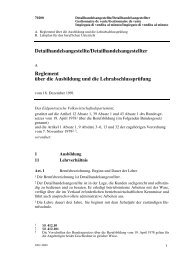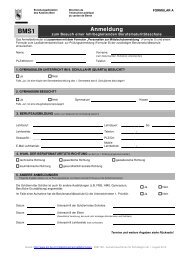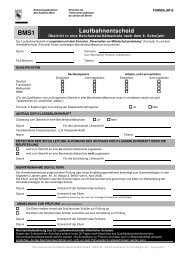Aufnahmeprüfung 2009 BMS I - Kaufmännische Berufsschule ...
Aufnahmeprüfung 2009 BMS I - Kaufmännische Berufsschule ...
Aufnahmeprüfung 2009 BMS I - Kaufmännische Berufsschule ...
Create successful ePaper yourself
Turn your PDF publications into a flip-book with our unique Google optimized e-Paper software.
<strong>Aufnahmeprüfung</strong> <strong>2009</strong><br />
<strong>BMS</strong> I<br />
<strong>Kaufmännische</strong> Berufsmaturitätsschulen<br />
Bern – Biel – Langenthal – Thun<br />
Name: ___________________________<br />
Punkte (max. 100 P.): ______________<br />
Experte 1: ________________________<br />
Englisch<br />
Serie 1/2<br />
Vorname: ________________________<br />
Note: ____________________________<br />
Experte 2: ________________________<br />
Punkte 92-100 83-91 74-82 65-73 55-64 45-54 36-44 27-35 18-26 9-17 0-8<br />
Note 6 5.5 5 4.5 4 3.5 3 2.5 2 1.5 1<br />
Prüfungszeit: 60 Minuten<br />
Hilfsmittel: Keine
A. LISTENING 10 points<br />
1/2 - 2<br />
You are going to hear a radio programme. You will hear the programme twice.<br />
First read items 1 - 10.<br />
After you have listened to the programme, decide if the statement for each of the<br />
items 1 - 10 is true (= yes) or not (= no). Mark your answer on the answer sheet.<br />
Now you have one minute to read through the statements.<br />
1. Travel-Care is a travel organisation giving passengers information about their<br />
flights.<br />
Yes □ No □<br />
2. Ruth London used to be a stewardess.<br />
Yes □ No □<br />
3. Tommaso flew to Great Britain to visit members of his family who live in<br />
Wales.<br />
Yes □ No □<br />
4. The Italian government has given Tommaso a ticket to return to Italy.<br />
Yes □ No □<br />
5. Tommaso and Darren Tylor are just two of more than 20 million people who<br />
receive help from Travel-Care each year.<br />
Yes □ No □<br />
6. Darren Tylor’s problem is that he has lost the air ticket his mother booked for<br />
him.<br />
Yes □ No □<br />
7. Travel-Care is a well-known organisation.<br />
Yes □ No □<br />
8. Travel-Care never gives travellers the money to buy their train tickets.<br />
Yes □ No □<br />
9. According to the report Heathrow and Gatwick are the only two airports in the<br />
world offering this kind of service.<br />
Yes □ No □<br />
10. Many of the Travel-Care assistants used to work at the airport themselves.<br />
Yes □ No □
B. READING & VOCABULARY 35 points<br />
1/2 - 3<br />
I. Free-diving in the Caribbean<br />
• Look at the sentences below about Tanya Streeter, a professional diver.<br />
• Read the text to decide if each sentence is correct or incorrect.<br />
• If it is correct, write C into the boxes provided.<br />
• If it is not correct, write N into the boxes provided. 20 points<br />
1) Tanya Streeter’s world record in 2003 was the deepest<br />
she had ever dived.<br />
2) There were other people in the water with Tanya during her<br />
record-breaking dive.<br />
3) Tanya accepts that free-diving can be an extremely dangerous<br />
activity.<br />
4) Tanya’s training programme depends on the event she is<br />
preparing for.<br />
5) Most of Tanya’s training takes place in the water.<br />
6) Tanya is careful to limit the number of training dives she does<br />
in a month.<br />
7) Tanya spends more time helping environmental organisations<br />
than appearing in advertisements.<br />
8) Tanya’s interest in the natural world started at an early age.<br />
9) Tanya has found that being famous has its advantages.<br />
10) Because she started free-diving fairly late, Tanya feels<br />
her sports career may be short.<br />
C/N
Free-diving in the Caribbean<br />
Tanya Streeter holds four world records in free-diving, the sport in which competitors reach<br />
extraordinary depths on only one breath of air.<br />
In 2003, Tanya Streeter made history when she became the first person to dive 120 meters into the<br />
ocean while holding her breath, and come back up to the top without help. She had been deeper a<br />
year before but on that occasion she swam back up using a balloon. This time, however, she held her<br />
breath for over three and a half minutes, which made her the only female in any sport to break the<br />
world record of a man. A team of fourteen safety divers at different depths watched the dive.<br />
Following reports of several serious accidents involving other divers, some people have complained<br />
that free-diving is too dangerous a sport, but Tanya doesn’t agree, insisting that safety is the most<br />
important thing, followed closely by training.<br />
Most free-divers concentrate on one or three types of event within the sport, but whatever Tanya is<br />
training for, her practice timetable remains the same. Two thirds of the programme is spent doing<br />
land-based training at the gym, with the rest divided between the pool and the ocean. She uses an<br />
exercise bike to help improve the fitness of her heart. However, she doesn’t run, whether outdoors or<br />
on running machines, because she doesn’t want to injure her knees. Instead, she finds that fast<br />
walking is a very good way to build her fitness. When she starts doing practice dives, she generally<br />
travels away from home. She aims to do fourteen dives over a four-week period, with a rest day<br />
between each diving day. It is essential that she doesn’t get tired because that could ruin all the<br />
preparation.<br />
1/2 - 4<br />
When Tanya is not preparing for an event, she makes frequent public appearances, mainly to<br />
advertise sports products. She has also supported environmental organisations, for example doing<br />
research projects or making films. Spending her childhood on the Caribbean island of Grand Cayman,<br />
she went swimming whenever she could, and long afternoons were spent exploring rock pools in order<br />
to watch the sea life. Tanya says that her life today is like living her childhood dreams. Because she is<br />
well-known in some countries, she thinks people are prepared to listen to her when she is talking<br />
about environmental issues.<br />
As for the future, Tanya, who is now in her thirties, says she plans to keep breaking her own world<br />
records. As she didn’t take up free-diving until she was twenty-five, Tanya is keen to stress that she<br />
doesn’t intend to retire from the sport for many years to come.
1/2 - 5<br />
II. Read this text about the history of shoes. Choose the correct word, A, B, C or D<br />
for each space. Write the correct letter in the box provided. 10 points<br />
The History of Shoes<br />
In the past, importance was not given to shoes being comfortable or fashionable.<br />
These early foot coverings were probably animal skins, (1) ……. people tied round<br />
their ankles during cold (2)……….. . We still use leather today, but (3) ………..<br />
materials such as silk, plastic, or cotton are also popular, (4) ………. on what is in fashion.<br />
I was only one hundred and fifty years (5) ………... that people began to wear a<br />
different shoe on each foot. Formerly, the two shoes had been straight instead of shaped and<br />
(6) ………. be worn on the left or the right foot. All shoes used to be made by hand, but now,<br />
(7) ………. there are shoemakers still using their<br />
(8) …………. skills, most shoes are now machine-made in large factories. The introduction of<br />
sewing machines (9) ……….. the shoe industry to produce large<br />
(10) ………… of cheaper shoes for a wider range of buyers.<br />
1) A who B why C which D where<br />
2) A weather B climate C temperature D condition<br />
3) A either B both C another D other<br />
4) A turning B depending C resting D taking<br />
5) A before B beyond C ago D after<br />
6) A must B could C ought D might<br />
7) A although B if C unless D since<br />
8) A typical B usual C model D traditional<br />
9) A let B allowed C gave D got<br />
10) A quantities B totals C sums D sizes<br />
III. Write the opposite (large ► small) of the underlined word. 5 points<br />
1) What a high mountain! ___________________________<br />
2) These shoes are comfortable. ___________________________<br />
3) The water in the pond is freezing. ___________________________<br />
4) They have made a safe trip. ___________________________<br />
5) You always ask intelligent questions! ___________________________
C. GRAMMAR AND STRUCTURES 35 points<br />
1/2 -6<br />
I. Irregular verbs. Fill in the chart with the correct verb forms. / 9p<br />
Infinitive Past Past participle German<br />
be<br />
meet<br />
fed<br />
caught<br />
brought<br />
risen<br />
II. Put the verbs in brackets into the correct tense. / 4p<br />
Present simple/continuous, past simple/past continuous, present perfect simple<br />
1. Listen! Somebody ________________________ (sing).<br />
2. Tim ________________ (buy) some new clothes yesterday.<br />
3. Jane and I are friends. I ________________ (know) her for a long time.<br />
4. My aunt _________________ (live) in Australia for 20 years now.<br />
5. I ______________________ (lose) my keys last night.<br />
6. It _____________________ (rain) when I got up this morning.<br />
7. What’s funny? Why ____________________ (you / laugh)?<br />
8. My job is interesting. I ____________________ (meet) a lot of people.<br />
III. Fill in the missing preposition. If no preposition is needed, write (-) in the<br />
gap. / 4p<br />
1. Don’t worry. I’ll look _______ your plants while you’re away.<br />
2. What time does the ferry arrive _______ the island?<br />
3. I am taking _______ my driving test on Friday morning.<br />
4. The customer was very annoyed and asked _______ the manager.
1/2 - 7<br />
IV. Complete the sentences using comparative or superlative forms of the<br />
adjectives in the list. / 5p<br />
good ● crowded ● warm ● interesting ● bad<br />
1. The weather is too cold in this country. I’d like to live somewhere __________<br />
2. There were a lot of people in the train. It was ______________ than usual.<br />
3. We had an awful time. It was one of the ______________ holidays in my life.<br />
4. She’s a very popular singer. She’s _____________ singer in the country.<br />
5. His job is quite boring. He’d like to do something ______________.<br />
V. Adjectives and adverbs. Underline the correct word. / 4p<br />
1. Please speak quiet / quietly. I’m trying to listen to the radio.<br />
2. I can hardly understand when she speaks so fast / fastly.<br />
3. I really like Steve because he’s so polite /politely.<br />
4. Liam is studying hard /hardly for his English examination.<br />
VI. Put the / much / many where necessary. / 4p<br />
1. I haven’t got _______ luggage with me. Just this bag.<br />
2. Cook _______ spaghetti for 8 minutes.<br />
3. Peter is very busy these days. He hasn’t got _______ free time.<br />
4. The bank was crowded. There were too _______ people.<br />
VII. Complete the table with the missing word. / 5p<br />
Country Nationality Language<br />
Italy<br />
Japan<br />
German<br />
Swedish<br />
Greek
C. WRITING 20 points<br />
1/2 - 8<br />
This is part of a letter you received from an English-speaking friend.<br />
You have just got back from your holidays, haven’t you?<br />
How was it? I hope you had fun! My next holidays are<br />
still months away.<br />
Now write a letter to your friend<br />
- thanking him/her for his/her letter<br />
- telling him/her about your last holidays and giving details<br />
- saying what you liked most about your holiday<br />
Write your letter in about 80-100 words.<br />
___________________________________________________________________<br />
___________________________________________________________________<br />
___________________________________________________________________<br />
___________________________________________________________________<br />
___________________________________________________________________<br />
___________________________________________________________________<br />
___________________________________________________________________<br />
___________________________________________________________________<br />
___________________________________________________________________<br />
___________________________________________________________________<br />
___________________________________________________________________<br />
___________________________________________________________________<br />
___________________________________________________________________<br />
___________________________________________________________________<br />
___________________________________________________________________
Key Serie 1 1 - 1<br />
A. LISTENING 10 points<br />
Assessors read the introduction as written in the exam and allow the students to read<br />
through the questions (one minute = time them).<br />
Please be aware, that you have to skip the introductory part as spoken on the CD<br />
(the part where the instructions are given). Start the recording where the<br />
conversation begins.<br />
1. No<br />
2. Yes<br />
3. Yes<br />
4. Yes<br />
5. No<br />
6. No<br />
7. No<br />
8. Yes<br />
9. Yes<br />
10. Yes<br />
B. READING & VOCABULARY 35 points<br />
Free-diving in the Caribbean<br />
1) N<br />
2) C<br />
3) N<br />
4) N<br />
5) N<br />
6) C<br />
7) N<br />
8) C<br />
9) C<br />
10) N<br />
20 Punkte<br />
The history of Shoes<br />
1) C<br />
2) A<br />
3) D<br />
4) B<br />
5) C<br />
6) B<br />
7) A<br />
8) D<br />
9) B<br />
10) A<br />
10 Punkte<br />
Opposites<br />
1) low<br />
2) uncomfortable<br />
3) boiling<br />
4) dangerous<br />
5) silly / stupid<br />
5 Punkte
1 - 2<br />
C. GRAMMAR AND STRUCTURES 35 points<br />
I.<br />
Infinitive Past Past participle German<br />
be<br />
bring<br />
feed<br />
meet<br />
rise<br />
catch<br />
II.<br />
was (oder) were<br />
brought<br />
fed<br />
met<br />
rose<br />
caught<br />
been<br />
brought<br />
fed<br />
met<br />
risen<br />
1. is singing 5. lost<br />
2. bought 6. was raining<br />
3. have known 7. are you laughing<br />
4. has lived 8. meet<br />
III.<br />
1. after 3. on<br />
2. for 4. or<br />
IV.<br />
1. warmer 4. the best<br />
2. more crowded 5. more interesting<br />
3. worst<br />
V.<br />
1. quietly 3. polite<br />
2. fast 4. hard<br />
VI.<br />
1. much 3. much<br />
2. the 4. many<br />
caught<br />
sein<br />
bringen<br />
füttern<br />
treffen, begegnen<br />
aufgehen<br />
fangen
VII. 1 - 3<br />
Country Nationality Language<br />
Italy<br />
Germany<br />
Greece<br />
Sweden<br />
Japan<br />
Italian<br />
German<br />
Greek<br />
Swedish<br />
Japanese<br />
Italian<br />
German<br />
Greek<br />
Swedish<br />
Japanese<br />
C. WRITING 20 points<br />
Assessment Criteria<br />
Writing A<br />
Students should use correct past tenses when talking about their holidays, give their<br />
opinion in an informal style and use correct comparative/ superlative structures to<br />
answer the last part of the task.<br />
General<br />
The following criteria should be taken into consideration when marking the writings:<br />
1. Content - 4p<br />
All content points are covered that are required in the task.<br />
2. Organisation and Cohesion – 4p<br />
The text is coherent and contains some linking devices.<br />
3. Accuracy – 4p<br />
There are few errors and the student shows mostly good control of the language.<br />
4. Appropriacy of Register and Format – 4p<br />
The letter is informal and does not contain any formal expressions.<br />
5. Range of Vocabulary – 4p<br />
There is a variety of structures and vocabulary.
<strong>Aufnahmeprüfung</strong> <strong>2009</strong><br />
<strong>BMS</strong> I<br />
<strong>Kaufmännische</strong> Berufsmaturitätsschulen<br />
Bern – Biel – Langenthal – Thun<br />
Name: ___________________________<br />
Punkte (max. 100 P.): ______________<br />
Experte 1: ________________________<br />
Englisch<br />
Serie 2/2<br />
Vorname: ________________________<br />
Note: ____________________________<br />
Experte 2: ________________________<br />
Punkte 92-100 83-91 74-82 65-73 55-64 45-54 36-44 27-35 18-26 9-17 0-8<br />
Note 6 5.5 5 4.5 4 3.5 3 2.5 2 1.5 1<br />
Prüfungszeit: 60 Minuten<br />
Hilfsmittel: Keine
A. LISTENING 10 points<br />
2/2 – 2<br />
You are going to hear a radio programme. You will hear the programme twice.<br />
First read items 1 - 10.<br />
After you have listened to the programme, decide if the statement for each of the<br />
items 1 - 10 is true (= yes) or not (= no). Mark your answer on the answer sheet.<br />
Now you have one minute to read through the statements.<br />
1. Tom is a university student from Leeds.<br />
Yes □ No □<br />
2. Tom found out about the job from someone he knows.<br />
Yes □ No □<br />
3. Tom works for four hours in the evening.<br />
Yes □ No □<br />
4. Tom has to stay in the store for about two hours after it closes.<br />
Yes □ No □<br />
5. Tom has to deal with all kinds of difficult problems himself.<br />
Yes □ No □<br />
6. Christine found her job through school.<br />
Yes □ No □<br />
7. Christine has had her job for two weeks.<br />
Yes □ No □<br />
8. Christine works every Saturday.<br />
Yes □ No □<br />
9. Christine’s main job is serving food.<br />
Yes □ No □<br />
10. Christine’s boss, Nick, likes to make sure that she is always busy.<br />
Yes □ No □
B. READING & VOCABULARY 35 points<br />
2/2 – 3<br />
I. Climbing to the top of Britain<br />
• Look at the sentences below about climbing Ben Nevis, a mountain in Scotland.<br />
• Read the text to decide if each sentence is correct or incorrect.<br />
• If it is correct, write C into the boxes provided.<br />
• If it is not correct, write N into the boxes provided. 20 points<br />
1) The climbers’ camp was at the bottom of Ben Nevis.<br />
2) Their equipment was of little use on the icy snow.<br />
3) The climbers were well prepared in case of emergency.<br />
4) The climbers were worried by the weather forecast.<br />
5) The whole group took regular breaks together.<br />
6) The writer realised that he had to improve his fitness.<br />
7) The climbers recognised the danger in taking the Tower Ridge path.<br />
8) From the top of Ben Nevis, the climbers had a view of the sea.<br />
9) The climbers shared the responsibility of map reading.<br />
10) The writer began to relax when he reached the top of the mountain.<br />
C/N
Climbing to the top of Britain<br />
Each year thousands of people climb Ben Nevis in Scotland, and because of its northerly<br />
location, the climate can be bitterly cold. Climber Keith Hewitt describes his first time on<br />
Ben Nevis.<br />
2/2 -4<br />
It was February, my first big winter climb. Our route was up the north face of the mountain to Tower<br />
Ridge. It’s six hundred metres up – probably the longest climb in Britain. We planned to camp for three<br />
days in the ‘Corries’, which are like big bowls cut into the walls of the mountain half-way up.<br />
We were carrying tents, sleeping bags, and metal spikes for our boots – you’d have trouble on Ben<br />
Nevis without them because you get snow so hard it’s like walking on ice. Even though some of the<br />
group were very experienced, we packed all kinds of safety equipment, including lights for attracting<br />
attention, hard hats and extra clothing. Although the weather forecast was perfect, with no strong<br />
winds, there was still a general feeling of nervousness when we set out. Ben Nevis in winter is always<br />
a challenge.<br />
The track soon climbed and my legs felt heavy. Being the weakest member of the group, I had to rest<br />
more frequently. The others sometimes stopped for a break to let me catch up, but as soon as I<br />
reached them they set off again. I promised myself that in future I would always train properly before a<br />
climb.<br />
After 200 metres, we reached the beginning of Tower Ridge, the route that would take us to the top of<br />
Ben Nevis. It’s only a metre and a half wide and the mountain drops away hundreds of metres on each<br />
side. We knew we had to keep calm and concentrate on every step as we moved slowly along it.<br />
After seven hours of climbing, we reached the top. On a clear day, you can see the sea and right<br />
across it to the island of Skye, 48 kilometres away. However, we weren’t so lucky, as a mist had come<br />
down.<br />
On Ben Nevis, getting back down to camp can be as much of a challenge as going up. You need to be<br />
able to read a map properly – a wrong turn could lead you to slopes too dangerous to go down in<br />
winter. I was glad we had decided to take it in turns to do that job. That first time, it was only when I<br />
was safe in the tent that I could say I really enjoyed the experience. But at least I made it to the top.
II. Read this text about grass. Choose the correct word, A, B, C or D<br />
for each space. Write the correct letter in the box provided. 10 points<br />
Grass<br />
2/2 - 5<br />
Grass is probably the most successful living plant in the world. There are over 9,000 different<br />
types of grasses and they are (1) ………. in every region on the earth. They are the (2) ……..<br />
flowering plants that can exist in the freezing (3) ……… of the Arctic and the Antarctic.<br />
Grasslands support a wide range of animal life, from tiny insects and birds to huge animals<br />
like cows and lions. All of them (4)……… on grass in one way or another.<br />
Grass (5) ……… very quickly after it is cut or (6) ……… . Unlike other plants, the new leaves<br />
grow from (7) ……… the soil, not from the top of the plant. That is (8)……… large families of<br />
animals are able to live together in one area. As (9) ……… as they have eaten all the grass<br />
there, a fresh meal is always (10) ……… because the plants start to grow again.<br />
1) A noticed B realised C caught D found<br />
2) A single B one C only D special<br />
3) A environment B scene C situation D background<br />
4) A depend B build C turn D hang<br />
5) A repeats B recovers C reduces D remains<br />
6) A hurt B broken C injured D damaged<br />
7) A beside B behind C below D beyond<br />
8) A why B where C what D when<br />
9) A fast B soon C quickly D often<br />
10) A available B present C free D complete<br />
III. Write the opposite (large ► small) of the underlined word. 5 points<br />
1) He is an experienced mountaineer. ___________________________<br />
2) Soon, she arrived at the top. ___________________________<br />
3) Can’t you be more careful? ___________________________<br />
4) I’ll never forget that joke! ___________________________<br />
5) The cat is all wet! ___________________________
2/2 - 6<br />
C. GRAMMAR AND STRUCTURES 35 points<br />
I. Irregular verbs. Fill in the chart with the correct verb forms. / 9p<br />
Infinitive Past Past participle German<br />
do<br />
keep<br />
found<br />
swam<br />
caught<br />
made<br />
II. Put the verbs in brackets into the correct tense. / 4p<br />
Present simple/continuous, past simple/past continuous, present perfect simple<br />
1. Please be quiet. I ______________________ (work)!<br />
2. Sandra _____________________ (be) here yesterday.<br />
3. My aunt ________________________ (live) in Canada for 15 years now.<br />
4. Peter _________________________ (sleep) until 10 o’clock last Saturday.<br />
5. I usually ________________________ (walk) to school.<br />
6. It _____________________ (rain) when I got up this morning.<br />
7. What’s wrong? Why ____________________ (you / cry)?<br />
8. Jane is in her office. She ___________________ (be) there since 7 o’clock.<br />
III. Fill in the missing preposition. If no preposition is needed, write (-) in the<br />
gap. / 4p<br />
1. I’ll meet you ___________ the train station.<br />
2. Will you take the dog ________________ a walk, please?<br />
3. Can you pass __________________ me the sugar, please?<br />
4. He is British but he lives _________________ Italy.
2/2 - 7<br />
IV. Complete the sentences using comparative or superlative forms of the<br />
adjectives in the list. / 5p<br />
crowded ● fast ● bad ● big ● good<br />
1. I’m very late. What’s the ___________________ way of getting from here to<br />
the station?<br />
2. We need a ___________________ flat. We don’t have enough space here.<br />
3. We had an awful time. It was one of the _________________ holidays in my<br />
life.<br />
4. Thank you. It was the _____________________ meal I’ve had for a long time.<br />
5. There were a lot of people on the train. It was ____________________ than<br />
usual.<br />
V. Adjectives and adverbs. Underline the correct word. / 4p<br />
1. Be careful / carefully when you are driving late at night.<br />
2. I’m awful / awfully sorry to hear that you have to move to another town.<br />
3. Why are you so angry / angrily? I haven’t done anything!<br />
4. She wants to leave the company because they pay very bad / badly.<br />
VI. Put the / much / many where necessary. / 4p<br />
1. There are _____________ words I don’t understand.<br />
2. Susan is very busy at the moment. She hasn’t got _____________ free time.<br />
3. I haven’t got _________________ experience with computers.<br />
4. I’ll have _________________ omelette with mushrooms, please.<br />
VII. Complete the table with the missing word. / 5p<br />
Country Nationality Language<br />
Spain<br />
Turkey<br />
French<br />
Russian<br />
Polish
D. WRITING 20 points<br />
This is part of a letter you received from an English-speaking friend.<br />
You read lots of books in your free time, don’t you? What<br />
are you reading at the moment? Could you recommend<br />
any of the books you have read so far? I’d really like to<br />
read a bit more, too.<br />
Now write a letter to your friend<br />
- thanking him/her for his/her letter<br />
- telling him/her about the book you are reading at the moment and giving your<br />
opinion about it<br />
- recommending him/her a book that you read in the past<br />
Write your letter in about 80-100 words.<br />
___________________________________________________________________<br />
___________________________________________________________________<br />
___________________________________________________________________<br />
___________________________________________________________________<br />
___________________________________________________________________<br />
___________________________________________________________________<br />
___________________________________________________________________<br />
___________________________________________________________________<br />
___________________________________________________________________<br />
___________________________________________________________________<br />
___________________________________________________________________<br />
___________________________________________________________________<br />
___________________________________________________________________<br />
___________________________________________________________________<br />
___________________________________________________________________
Key Serie 2 2 - 1<br />
A. LISTENING 10 points<br />
Assessors read the introduction as written in the exam and allow the students to read<br />
through the questions (one minute = time them).<br />
Please be aware, that you have to skip the introductory part as spoken on the CD<br />
(the part where the instructions are given). Start the recording where the<br />
conversation begins.<br />
1. No<br />
2. Yes<br />
3. No<br />
4. No<br />
5. No<br />
6. Yes<br />
7. No<br />
8. Yes<br />
9. No<br />
10. Yes<br />
B. READING & VOCABULARY 35 points<br />
Climbing to the top of Britain<br />
1) N<br />
2) N<br />
3) C<br />
4) N<br />
5) N<br />
6) C<br />
7) C<br />
8) N<br />
9) C<br />
10) N<br />
20 Punkte<br />
1) D<br />
2) C<br />
3) A<br />
4) A<br />
5) B<br />
6) D<br />
7) C<br />
8) A<br />
9) B<br />
10) A<br />
Grass<br />
10 Punkte<br />
Opposites<br />
1) inexperienced<br />
2) bottom<br />
3) careless<br />
4) remember<br />
5) dry<br />
5 Punkte
2 - 2<br />
C. GRAMMAR AND STRUCTURES 35 points<br />
I.<br />
Infinitive Past Past participle German<br />
do<br />
catch<br />
find<br />
keep<br />
make<br />
swim<br />
II.<br />
did<br />
caught<br />
found<br />
kept<br />
made<br />
swam<br />
1. am working 5. walk<br />
2. was 6. was raining<br />
3. has lived 7. are you crying<br />
4. slept 8. has been<br />
III.<br />
1. at 3. ---<br />
2. for 4. in<br />
IV.<br />
1. fastest 4. best<br />
2. bigger 5. more crowded<br />
3. worst<br />
V.<br />
1. careful 3. angry<br />
2. awfully 4. badly<br />
VI.<br />
1. many 3. much<br />
2. much 4. the<br />
done<br />
caught<br />
found<br />
kept<br />
made<br />
swum<br />
tun<br />
fangen<br />
finden<br />
(be)halten<br />
machen<br />
schwimmen
VII. 2 - 3<br />
Country Nationality Language<br />
Spain<br />
France<br />
Poland<br />
Russia<br />
Turkey<br />
Spanish<br />
French<br />
Polish<br />
Russian<br />
Turkish<br />
Spanish<br />
French<br />
Polish<br />
Russian<br />
Turkish<br />
C. WRITING 20 points<br />
Assessment Criteria<br />
Writing B<br />
Students should use correct present tenses when talking about the book they are<br />
reading at the moment and be able to express their opinion in an informal style. They<br />
should also use correct past tenses and know how to recommend a book in an<br />
informal style.<br />
General<br />
The following criteria should be taken into consideration when marking the writings:<br />
1. Content - 4p<br />
All content points are covered that are required in the task.<br />
2. Organisation and Cohesion – 4p<br />
The text is coherent and contains some linking devices.<br />
3. Accuracy – 4p<br />
There are few errors and the student shows mostly good control of the language.<br />
4. Appropriacy of Register and Format – 4p<br />
The letter is informal and does not contain any formal expressions.<br />
5. Range of Vocabulary – 4p<br />
There is a variety of structures and vocabulary.


